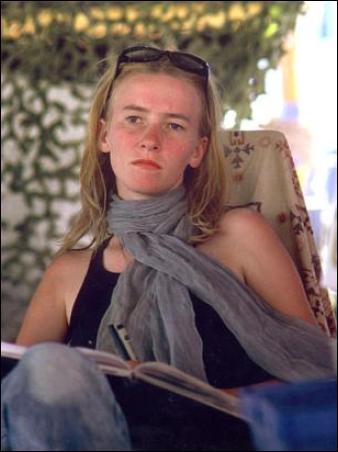
A Haifa court has ruled that the state of Israel was not responsible for the death of US activist Rachel Corrie, who was killed in the Gaza Strip by an Israeli army bulldozer in 2003.
Rachel Corrie’s family had brought a civil claim for negligence against the Israeli ministry of defence.
The judge said the 23-year-old’s death was a “regrettable accident” and that the state was not responsible.
Rachel Corrie had been trying to stop Palestinian homes being pulled down in Gaza.
Judge Oded Gershon, presiding at the court in the town of Haifa, said Rachel Corrie had been protecting terrorists in a designated combat zone.
He said the bulldozer driver had not seen her, adding the soldiers had done their utmost to keep people away from the site.
“She [Corrie] did not distance herself from the area, as any thinking person would have done.”

The judge ruled the state of Israel did not have to pay any damages.
The Corries had requested a symbolic $1 in damages and legal expenses.
They had accused Israel of intentionally and unlawfully killing their daughter, and failing to conduct a full and credible investigation.
An Israeli army investigation in 2003 concluded its forces were not to blame for Rachel Corrie’s death.
Cindy and Craig Corrie travelled to Israel from the US to hear the ruling along with a group of friends and activists.
After the ruling, Cindy Corrie told a news conference they wanted to see more accountability from the state of Israel, saying they had been “deeply troubled by what we heard today”.
“From the beginning it was clear to us that there was… a well-heeled system to protect the Israeli military, the soldiers who conduct actions in that military, to provide them with impunity at the cost of all the civilians who are impacted by what they do,” she said.
She said she believed at least one person in the bulldozer had seen their daughter, and that Rachel’s death “could have been and should have been avoided”.
She added: “I believe this is a bad day not only for our family, but a bad day for human rights, for humanity, for the rule of law and also for the country of Israel.”
Israeli government spokesman Mark Regev says that, according to court evidence, the driver did not see Rachel Corrie.
“If you read the seven pages of transcript by the judge after hearing all the evidence for months now, he says that the tractor drivers moved away from the demonstrators on a number of occasions, that the demonstrators took, he says, unreasonable, illogical action, putting themselves in danger.”
“It’s clear by the Corrie family’s own expert – they nominated an expert to come to the court – he himself, their representative, said that it was impossible for the driver to see her.”
The Corrie family’s lawyer has said they will appeal against the ruling to Israel’s supreme court.
Rachel Corrie was a committed peace activist even before her arrival in the Gaza Strip in 2002.
She had arranged peace events in her home town in Washington State and become a volunteer for the pro-Palestinian International Solidarity Movement (ISM).
In 2003, Rachel Corrie was in the town of Rafah in the southern Gaza Strip as part of a group of ISM protesters.
They were acting as human shields to try to stop the Israeli army demolishing Palestinian homes and clearing land around Rafah.
The Israeli army argued the area was being used by militants and that the protesters should not have been in a closed military zone.
The army’s investigation found that Rachel Corrie was not visible and that she was killed by debris falling on her.
But Rachel Corrie’s supporters say it is impossible that the bulldozer driver did not see her.
“The bulldozer had a clear line across open ground while it drove towards her, relatively slowly, 20 or 30 metres or so, and even the estimation of the bulldozer’s line of sight… would clearly suggest that during that time the bulldozer driver must have seen Rachel,” said activist Tom Dale, who was protesting alongside Rachel Corrie on the day she was killed.
Pictures taken on the day Rachel Corrie died show her in an orange high-visibility jacket carrying a megaphone and blocking the path of an Israeli military bulldozer.
A collection of Rachel Corrie’s writings was turned into a play – My Name Is Rachel Corrie – which has toured all over the world, including Israel and the Palestinian territories.
[youtube ExSBeW_-e1c]